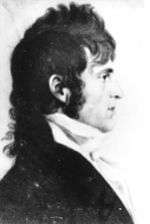Waller Taylor
| Waller Taylor | |
|---|---|
 | |
| Virginia House of Delegates | |
|
In office 1800–1802 | |
| Indiana Territorial Legislature | |
|
In office 1809–1816 | |
| United States Senator from Indiana | |
|
In office December 11, 1816 – March 3, 1825 | |
| Preceded by | None |
| Succeeded by | William Hendricks |
| Personal details | |
| Born |
before 1786 Lunenburg County, Virginia |
| Died |
August 26, 1826 (aged 39–40) Lunenburg, Virginia |
| Political party |
Democratic-Republican National Republican Party |
| Military service | |
| Service/branch | United States Army |
| Rank | general |
| Battles/wars |
Tecumseh's War War of 1812 |
Waller Taylor (before 1786 – August 26, 1826) was an American military commander and politician.
Biography
Taylor was born in Lunenburg County, Virginia where he spent his entire childhood. He studied law and served in the Virginia House of Delegates from 1800 to 1802.
In 1804 he moved to Vincennes, Indiana and practiced law there. He was appointed chancellor of the Indiana Territory in 1807. Also in 1807, he became a major in the territorial militia. He fought against Native Americans and served as an aide-de-camp to William Henry Harrison during the Tecumseh's War in 1809 to 1810. He participated in the Battle of Tippecanoe.
Taylor continued in the United States Army during the War of 1812 and rose to the rank of adjutant general.
Taylor was a strong supporter of slavery and believed that slavery should have been allowed in Indiana. The slavery party had lost its majority status in the 1809 election and Taylor was part of the pro-slavery party trying regain power. He campaigned to become the congressional representative for Indiana in 1812 but was defeated by Jonathan Jennings. He had a hot temper and during the campaign challenged Jennings to a duel; Jennings declined.
In 1816, when Indiana became a state, he was chosen along with James Noble to join the United States Senate as the first senators from Indiana. Taylor was elected to a full term in 1818 and left the Senate when that term expired in 1825.
Taylor was a member of the faction in the United States Senate that supported John Quincy Adams and Henry Clay. He was also associated with the United States Democratic-Republican Party and the United States National Republican Party.
Little else is known about the rest of Taylor's life except that he returned to Lunenburg, Virginia, and died there a year after leaving the Senate, of natural causes.
Taylor was buried on his family's land in Lunenburg, Virginia.
| United States Senate | ||
|---|---|---|
| Preceded by None |
U.S. Senator (Class 3) from Indiana 1816–1825 Served alongside: James Noble |
Succeeded by William Hendricks |
| ||||||||||||
|
